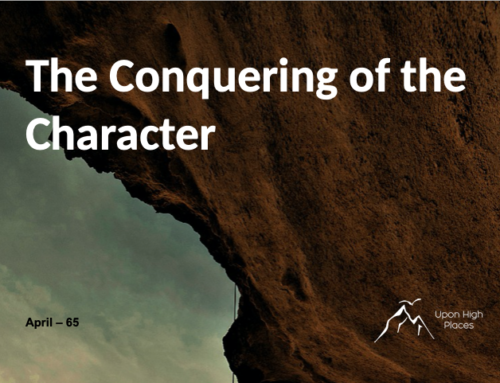Unions that bless – Part 1
June 2022
My dear youth:
One of the most critical and important issues in the life of a Christian is the choice of a partner for marriage. All further life depends on this decision. For almost everything we do in life, we need to prepare thoroughly, such as pursuing a profession. We will have to spend several years to learn. Without preparation, the development of a work done acceptably is unthinkable. And the more specialized professions require many more years.
To carry out a profession we need to dedicate a lot of time to it beforehand, because the security and stability of the individual and of society depend on it. Can you imagine a person who wants to be a surgeon without having studied? Who would place themselves in his hands? These arguments are universally accepted by most, but when it comes to marriage, few think that preparation is needed to enter a relationship that should last a lifetime. And it is needed, of course; everything else will depend on it, even working life is positively or negatively affected by the kind of marriage we have.
I would like, through this writing, to share with you, dear young people, certain guidelines or advice that we can find in the Bible, a sure guide that will help us forge successful marriages. The Spirit of Prophecy urges us to work in this direction if we want to taste the honey of one of the most important divine institutions created by God. “Examine carefully to see if your married life would be happy or inharmonious and wretched. Let the questions be raised, Will this union help me heavenward? Will it increase my love for God? And will it enlarge my sphere of usefulness in this life? If these reflections present no drawback, then in the fear of God move forward.” The Adventist Home, pg. 45.
Of the same faith
A very important principle to consider is marrying people of the same faith. The Lord established from very ancient times that the Hebrews unite only with people of their own people. They could not marry men or women who did not share the same faith: “… You shall make no covenant with them nor show mercy to them. Nor shall you make marriages with them. You shall not give your daughter to their son, nor take their daughter for your son.” Deuteronomy 7:2, 3. Upon obedience to this order depended the stability of the nation and of the individuals, but this commandment was not always respected and negative results were seen.
We will cite as an example the marriage of Ahab. This man was the seventh king of Israel and reigned twenty-two years (1 Kings 16:29-30). The biblical story says: “Now Ahab the son of Omri did evil in the sight of the Lord, more than all who were before him. And it came to pass… that he took as wife Jezebel the daughter of Ethbaal, king of the Sidonians; and he went and served Baal and worshiped him.” 1 Kings 16:30-31. In these texts it is seen that it was his pagan wife who induced or influenced him to introduce the cult or worship of Baal and Ashtoreth in Israel. The king erected pagan temples and persecuted the true prophets of God. As if this wasn’t wicked enough, he murdered his neighbor Naboth to get a parcel of his land, and it was all his wife Jezebel’s idea. “Satan had used an unconsecrated woman to change the heart of the king, and through him to cause Israel to sin. It is a terrible thing to be a satanic instrument…”
When Solomon joined with pagan women, dire consequences followed. Samson consorted with heathen women and had to suffer terrible results, ultimately causing his death.
The enemy used intermarriage to lead Israel away from the divine purpose of being a peculiar and holy nation. The influence of his pagan spouses affected his mind to the point of making him forget his own religion. Let’s remember the case of Balaam, who wanted to curse Israel for making money with King Balak, but he couldn’t because God had blessed the people. The devil inspired Balaam with a plan that worked and that was to induce the Israelites to intermingle sexually with the pagan women of Moab and thus Israel lost divine favor. I do not mean by this that an Adventist Christian should never marry a once Jew, for example, or a Catholic or another. If they convert and accept the faith we profess, there is no problem in carrying out this marriage. We have the example in the case of Ruth the Moabite; she was not of God’s people, but she accepted the faith of Israel (Ruth 1:16) and she married an Israelite from Bethlehem, becoming part of the lineage of Jesus. The problem in our day is not race, culture, or geographic origin, but the faith that we embrace. The apostle Paul clearly tells us that we should “… not be unequally yoked together with unbelievers.” 2 Corinthians 6:14.
Consulting God
The fact of marrying a person of the same faith does not guarantee one hundred percent that it will be a success and that everything will work out very well. The evidence proves it. There are also marriages forged within the church that fracture. What is the reason? Not having consulted God before marriage. The couple consulted the heart, feelings, emotions, physical attractiveness, or other aspects, but in reality, although this has its specific weight in a relationship, it is not decisive. The most important thing is divine approval. If we pray to God to help us buy a house or a car, it is much more important to ask Him to guide us in choosing that person with whom we must share our lives. “If any of you lacks wisdom, let him ask of God, who gives to all liberally and without reproach, and it will be given to him.” James 1:5.
“Marriage is something that will influence and affect your life both in this world and in the world to come. A sincere Christian will not advance his plans in this direction without the knowledge that God approves his course. He will not want to choose for himself, but will feel that God must choose for him. We are not to please ourselves, for Christ pleased not Himself. I would not be understood to mean that anyone is to marry one whom he does not love. This would be sin. But fancy and the emotional nature must not be allowed to lead on to ruin.” The Adventist Home, pg. 43.
“If men and women are in the habit of praying twice a day before they contemplate marriage, they should pray four times a day when such a step is anticipated.” Messages to Young People, pg. 460.
Consecration
In choosing a partner for marriage, it is important to consider the kind of spiritual life that the person lives. He is a member, but this is not enough; we must know if he loves God above all things, because in this case his priority will be to do God’s will. A youth who is consistent with the faith he professes will keep the word he has given to his wife or husband on the day of their marriage. He will be faithful to God and his spouse and responsible for him in the domestic circle. The more we love God and the more faithful we are in serving him, the more we will love those around us, especially our spouse.
“God wants the home to be the happiest place on earth, the very symbol of the home in heaven. Bearing the marriage responsibilities in the home, linking their interests with Jesus Christ, leaning upon His arm and His assurance, husband and wife may share a happiness in this union that angels of God commend.” The Adventist Home, pg. 102.
During the time of courtship it is evident that one must be very careful not to cross the line of purity and chastity. It is necessary to take measures and mutual decisions so as not to transgress the commandment. A premarital sexual relationship can ruin the couple’s entire subsequent sexual experience, or at the very least leave deep trauma and guilt. There is also the danger that the girl will get pregnant, and this will bring with it many complications in the relationship.
Chastity, then, until marriage, becomes imperative and for purity to reign in the heart and direct life, consecration to God is fundamental. If you have evidence that your partner is addicted to porn, don’t marry them. Think very carefully before marrying someone who does not control their sexual desires, unless there is evidence of a genuine change. “I beseech you therefore, brethren, by the mercies of God, that you present your bodies a living sacrifice, holy, acceptable to God, which is your reasonable service.” Romans 12:1.
Affinity
A marriage is made up of two different people with different: mentality, education, family origin, genetics, etc. It is not easy for two individuals to fit perfectly, so it should be sought that there is at least the greatest possible affinity between them. It is not a guarantee that you both like the same things and that it will make you happy. But it is true that, if both coincide in hobbies and tastes, it will be much better.
Sometimes I have seen marriages of people who have very different tastes forge and later spend their lives each one immersed in their respective bubbles without converging with the other, each one on their island. It would be better if they shared activities, doing things together, in short, uniting the interests of one and the other as much as possible. It unites the couple a lot to get involved in common hobbies. It has been seen that the happiest couples are those who do things together or who spend time together and share tastes and hobbies.
If one likes children and the other doesn’t, if one loves nature and the other doesn’t like to leave the city, if one loves animals and the other hates them, if one loves music and the other is indifferent to it, if one likes social relationships and the other is withdrawn and sullen, etc., etc., the question is: Will that relationship work? At least you have to think about it, because it is difficult for a relationship of this kind to forge. “Can two walk together, unless they are agreed?” Amos 3:3.
Conclusion
In the next pastoral letter we will continue analyzing those important aspects to take into account before getting married. May the Lord bless you, dear youth, and may you be happy. Amen.
José Vicente Giner
Pastor and leader of the Youth Department
of the General Conference
For personal and group reflection:
- Why do you think the choice of a spouse is important?
- What means does the young person have to prepare himself to take this big step?
- Why is it important to marry people of the same faith?
- How can we know that a person is consecrated to God?
- Why is it important that there is an affinity between the couple?
- What step do you consider the most important before getting married?







